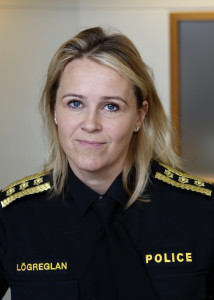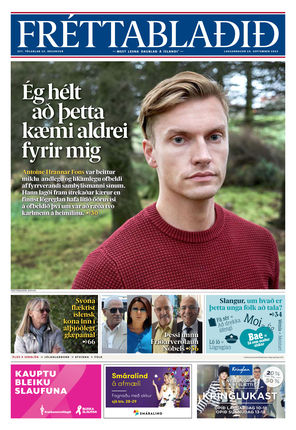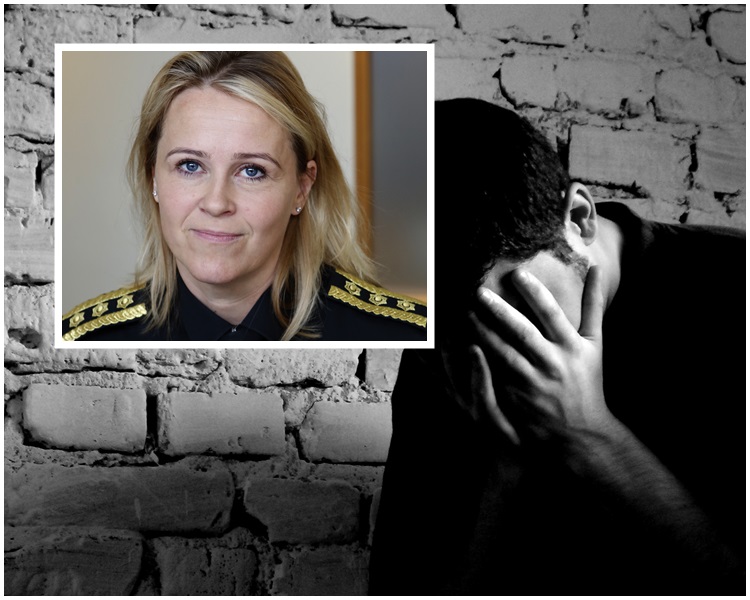Last weekend a gay man, Antoine Hrannar Fons, opened up in the media and described in a harrowing account how he suffered domestic violence at the hands of his former partner for years, without getting proper assistance from local police. Since then a counsellor on violence has stated that men, especially gay men, feel that the police is not taking domestic violence against them seriously enough. However District Commissioner Sigríður Björk Guðjónsdóttir says that victims are not being discriminated against because of gender or sexuality or any other factor for that matter. Police protocols don’t exclude anyone.

”Obviously it’s a terribly sad story and if mistakes were made, we need to make sure they don’t happen again,“ says Sigríður Björk. ”But we have recently revised our work procedures; we’ve taken a firm stand when it comes to domestic violence. It’s not without a reason that we’re putting more effort into these cases. Domestic violence wasn’t considered sufficiently serious by the system before but I believe that now such cases are being dealt with appropriately.“
And what about the criticism raised by both Antoine and a counsellor on violence, Thelma Ásdísardóttir, that police officers don’t seem to take domestic violence as seriously if the victims are male or the couples are same-sex?
”To be honest, I’m not aware of any such notion. I have asked around in-house about this but no one seems to recognize what they’re describing and it’s not the vibe I normally get. I do respect Thelma as an expert on this subject however, but I would have to see reports on individual cases to be able to make an assessment,“ she says and adds that since evidence shows that women are also perpetrators and men victims, then the same protocol goes for everybody. ”The sexes will get equal treatment.“
Sigríður Björk says furthermore that she would like to do meet with Thelma, and others working in this field, to introduce the new protocols to them. And that she’s open to the possibility that there’s need for more or different kind of information and training. ”But the way the work process is today, this shouldn’t be happening now. And obviously, I can’t comment on Antoine’s case or any individual case in the media.“
”Obviously it’s a terribly sad story and if mistakes were made, we need to make sure they don’t happen again.“
Since you were appointed District Commissioner, you’ve openly talked about improving the ways in which the police deals with domestic violence. Has something changed?
”Yes, we’ve completely revised our protocol and made some drastic changes. A new approach was regulated in December 2014 and as of 12th of January this year, the City of Reykjavík and the metropolitan police started a project “Together against violence” and other police forces and municipalities have implemented this approach.
We now deal with these cases completely different; we do full field research right away, we call for a social counsellor for the victim and someone from child services if needed and we try to do a follow-up a week later. And the same goes for everybody, it doesn’t matter what gender the victim or the perpetrator are, same protocol goes for everybody.
Since the new approach started, we’ve had over a 130% increase of domestic violence cases, from approximately 20 cases a month to 50 cases a month. And since the new protocol was implemented we’re exercising restraining orders more often, as well as expulsions from home.“
And so are police officers now better informed and trained in dealing with domestic violence?

”Yes, we’ve made a special effort in educating them and because the number of cases has increased so much, we now have a weekly meeting where we go over ongoing cases and assess whether they’re being dealt with accordingly.
We also carry out risk analysis because unfortunately in majority of domestic violence call-outs we get, we find out that it’s not at all the first time there’s been violence in the home. There’s almost always a history of violence.”
Again, what about when it’s a gay couple, in light of what has been claimed in the media recently; that gay men who turn to the police because of domestic violence feel as if they’re not being taken seriously. That they feel as if their domestic conflicts are viewed as more light-weight than others and there’s just more drama around them than other couples?
”I think they’re basing these claims mostly on a feeling. But I repeat, the system didn’t consider domestic violence serious enough before. The change was only made last January so all I can say is that the current protocols don’t exclude anyone, as long as there’s one relative or connected individual being violent towards another one, gender or sexuality is completely irrelevant.
So our approach today is different and for all I know, victims aren’t being discriminated against because of their gender or sexuality. As soon as there’s a case that falls under our definition of domestic violence, it’s dealt with according to protocol.“
”Since the new approach started, we’ve had over a 130% increase of domestic violence cases, from approximately 20 cases a month to 50 cases a month.“
But do police officers get any special education on how to deal with domestic violence among gay or queer (i. hinsegin) couples, as is known to be the case in some police forces abroad?
”No, we have included “Men Take Responsibility” (i. Karlar til ábyrgðar) therapy program and had a spokesman from them speaking to our officers but they basically refer to both male and female perpetrators.
But as I said, I’m open to hearing other viewpoints. And if there’s something that we need more education about, then we can always improve our training.“
Note: The therapy program for perpetrators “Men Take Responsibility” (i. Karlar til ábyrgðar) will soon be called “Domestic peace” (i. Heimilisfriður) since evidence shows that women are also perpetrators when it comes to domestic violence.


